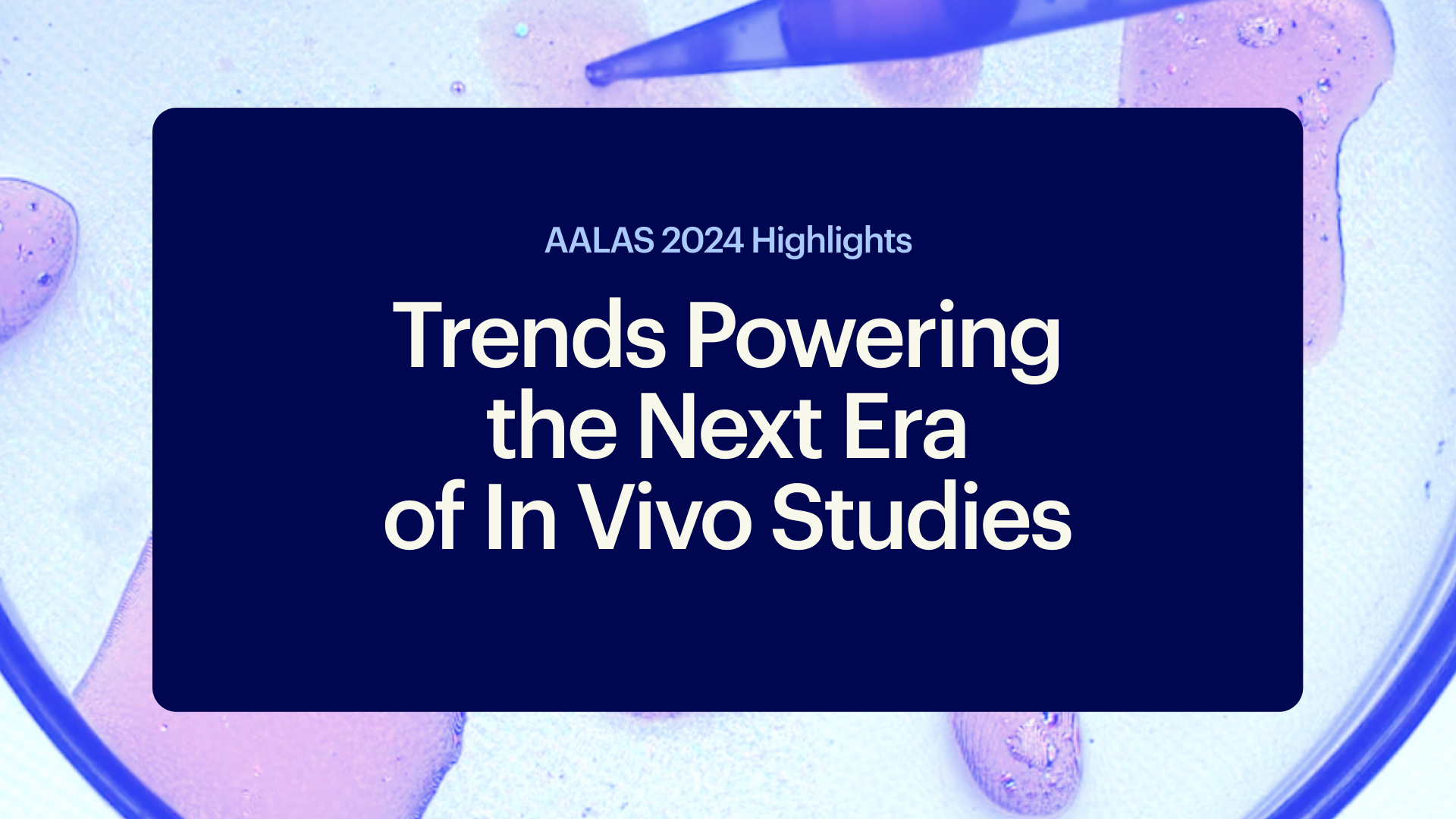AALAS 2024 highlights: Trends powering the next era of in vivo studies

In vivo research practices are adapting quickly, with digitization allowing the rapid collection of a lot more data and shaping the way we study different therapeutic areas. This is reflected in the increased adoption of cloud-based solutions. According to Benchling’s 2nd annual State of Tech in Biopharma Report, 23% of small and 17% of large biopharma have adopted cloud-based scientific software or SaaS.
For the first time at the 75th American Association of Lab Animal Sciences Congress (AALAS) 2024, AI was a prominent theme on the agenda.
Throughout sessions and conversations with industry innovators, three trends stood out as high priority for every lab: an eagerness to collaborate with scientific colleagues outside of in vivo teams, a desire to digitize lab processes, and an openness to engaging AI and integrate SaaS solutions/instruments to maintain the best animal welfare practices.
1. Eliminate silos of data and errors
One area that was highlighted frequently was how to use technology to prevent data collection errors for in vivo researchers. Relatedly, innovators isolate their teams if they become siloed from the upstream and downstream teams with whom they collaborate on a daily basis.
Specifically, technology needs to connect scientists to prevent task duplication and data silos. If teams can’t directly share data and get a holistic view across teams, they put a lot at risk: This can lead to study repeats and an inability to gain any insight when comparing experiments.
Benchling In Vivo enables better collaboration for scientists across the R&D lifecycle, allowing teams to spend more time on science and less on repetitive manual tasks.
2. Digitize lab processes — no more paper!
Many scientists and technicians discussed how they’re digitizing lab processes to overcome data repeatability issues and speed up manual processes. This requires digital tools that can connect parts of the vivarium while maintaining the highest levels of 3Rs compliance (Reducing, Refining and Replacing animals in scientific discovery).
Animal studies often involve a component run externally through a CRO (e.g. assays on animal samples or the entire study itself). Data from the CRO often comes in PDF/Excel/Word or powerpoint, requiring a time-intensive and error-prone process of restructuring such that it can be aggregated and graphed.
Capturing, organizing, and analyzing study data is a challenge for many scientists. It’s also hard to capture data in a structured and objective way — especially when there are multiple scientists collaborating on a data set. Labs are looking to remove manual data entry, which leads to human errors and adds unnecessary steps into a process where time is critical.
Benchling In Vivo task and enhanced device connectivity which allows for automated data capture and reduced human error and lab time. Investigating the use of LLMs to ingest CRO data in a structured format, preventing errors.
3. Build the highest level of animal welfare practices into lab workflows
Many scientists expressed that lab technology’s lack of interoperability is a challenge. There are tools and softwares for animal breeding and reporting, animal identification, data capture, in-life measurement, sample handling, and more. Some of these are now taking advantage of AI to automate laborious tasks. While each one aims to individually improve the speed, consistency, and accuracy of the scientific process, it’s only truly efficient when those tools integrate seamlessly together. In fact, having too many disconnected tools can slow your team down, impacting animal welfare. Unifying tech used in the vivarium makes it possible to uphold the highest levels of 3Rs compliance.
Benchling has continued to build integrations with partner organizations (a.tune and softmouse) for activities like colony management to support regulatory reporting, animal identification (UID and RapID) to improve tracking during studies, and analytics packages to gain insights of trends between studies (Prism). All of these help to improve staff morale, while maintaining best practices for humane animal management.
Powering in vivo innovation
From embracing the power of AI, to improving collaboration while keeping the highest standards of animal welfare, the AALAS community has again proved its dedication to innovate. Benchling is committed to the same goals, and we are looking forward to continuing these conversations with our European colleagues at FELASA 2025 in Athens (June), and to doing it all again at AALAS 2025 in Long Beach!
Learn more about Benchling In Vivo or join our webinar to learn more.
Powering breakthroughs for over 1,300 biotechnology companies, from startups to Fortune 500s
